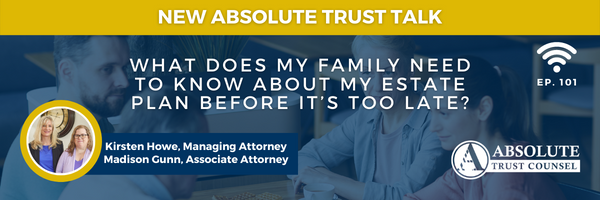The quest to follow a client’s wishes will always top the list of priorities for any conscientious estate attorney — keeping all parties concerned out of court likely runs not far behind — and while there’s no failsafe way to ensure that priority #2 is 100% achieved, having an honest and open communication among family members about your estate plan is the best way to stack the odds in your favor.
The subject of estate planning can make family members feel a little uneasy, even when some of its most obvious aspects are often left unspoken. For example, where to find the estate planning documents needed to carry out your wishes and the location of the assets to be distributed to your heirs as you see fit. This can lead to confusion, especially when emotions are already at a fever pitch. The chasms it can create among family members can last a LONG time — sometimes even permanently.
Notifying your family members of your wishes as clearly as possible is the best way to avoid surprises and the potential fallout that might result from them. And while it’s a great idea to get family input on several aspects of your estate plan, this input shouldn’t be the only factor in shaping your decisions. You shouldn’t have to ask your children for permission to create your estate plan as you see fit.
With all this in mind, planning your estate, so things go as smoothly as possible when it comes time to carry out your wishes seems pretty challenging, doesn’t it? It often is, but let’s see if we can make it a little less daunting. Join us for a new episode of Absolute Trust Talk, as Kirsten Howe and associate attorney, Madison Gunn, take a closer look at several ways to take the surprise element out of estate planning to reduce the chances of resentment that can drive a wedge between family members.
In this episode, we’re going to discuss:
- How our migration to the digital age has added an extra challenge to conveying your wishes to family members
- Why deciding on the right trustee — as well as knowing who it SHOULDN’T be — is so crucial
- The important conversation that should come even before you sit down with family members to discuss your estate plan
- Why making ALL of your wishes known — including those for end-of-life care — is such a kindness to your survivors
- A few of the commonly encountered assets that are especially prone to triggering hard feelings and resentment
And more.
There is no single right way to plan for the distribution of your estate’s assets when you’re no longer around. Just as every family is different, so are the relationships between its family members. But, making sure that the essential details of your estate plan are properly discussed can go a long way toward keeping peace and harmony in the future.
Big Three from Episode #101:
- Many families see the appointment of one of the surviving children as a trustee to be a sort of birthright based on seniority. This may make deciding who ultimately takes on that responsibility a little easier, but the negative consequences that may come with this method often far outweigh its expediency. The role of trustee can be challenging and thankless — it often involves a lot of work and emotional fortitude. Arriving at this decision based on who can best handle this role — as opposed to which child greeted the world first — is a far better way to appoint your trustee.
- Estate planning involves several difficult decisions, and while it’s a good idea to make sure that all of these decisions are conveyed to family members clearly and at a time when they can be discussed, not all lend themselves to a group setting. There are a number of instances where one-on-one interaction is the best way to foster honesty, minimize emotional awkwardness as possible and ensure your true wishes are ultimately carried out.
- There might be plenty of reasons why you wouldn’t plan on dividing your assets up equally among your surviving children — maybe one child ends up taking on the responsibility of your end-of-life care and is currently living in the family home, for example. Regardless of your rationale, asymmetrical inheritance — the unequal distribution of assets among surviving family members — is one of the root causes of resentment, so it merits special attention and an honest discussion.
Time-stamped Show Notes:
0:00 Introduction
1:57 Madison and Kirsten kick off the show by highlighting one of the most prominent estate planning topics you’ll want to discuss with your family. Luckily, it’s also among the easiest to resolve.
3:15 Where are your assets? Does your family know? This is also a vitally important topic that should be talked about before it’s too late.
5:00 Do you have assets like insurance policies that don’t get statements very often? If so, it’s even more important to let your family know about their status.
5:50 Most of us have ongoing digital accounts that aren’t assets but are continuing obligations. Those who are taking care of your estate must be able to access them and cancel subscriptions as needed.
7:15 Kirsten and Madison talk about how they help clients organize and keep essential information accessible in every Absolute Trust Counsel estate planning binder. No matter who your attorney is, you should consider including this type of information with your estate plan.
8:11 The next question that comes up very often is, who should or should not be your successor trustee?
8:56 Many parents use this method of choosing a trustee. It’s better than having no method at all, but it’s often a prescription for problems down the line.
9:32 Think that you already have your trustee picked out? Madison advises meeting your attorney to help you get a clearer picture of what that role entails so that you’ll know if you’re making the right choice.
10:20 Remember, not all estate planning issues are best covered in a family discussion. Here’s why.
11:35 The health care directive is one of the most important estate planning topics of all. Start listening now for what you need to know.
12:35 While a health care directive should spell out your wishes, here’s why having a discussion on those wishes can also make things simpler.
14:59 Consider your end-of-life decisions a kindness to your family and your health care agent and make them known to everyone who will be involved! Also, don’t put any decision-making or discussions off, even if there’s no expectation of health troubles in your immediate future.
15:40 The disposition of remains can make family members very uncomfortable, but it still needs to be addressed. So your family can proceed as best they can.
17:20 Are there religious aspects that need to be considered for end-of-life or after-death? Your estate plan and health care directive also need to express these wishes. Write it down and talk about it!
18:10 Next up, let’s talk about the tangible stuff. Even if they hold limited financial value, these items can cause plenty of familial discord if not sorted out ahead of time.
20:20 Disagreements about family keepsakes can often transcend generations, such as in this example.
22:30 Real estate is another big challenge in estate plans, especially if family members live in your home. It’s got to all be in your estate plan, and there shouldn’t be any surprises.
24:00 What does your inheritance arrangement look like? If you’re treating your heirs differently – especially if they are your children, there will likely be resentment.
26:30 You shouldn’t ask your children for permission to create your estate plan as you see fit, but you should let them know your plan.
28:48 Don’t think you can bring yourself to have the estate planning discussion? Here’s a potential alternative.
29:37 Q&A: Is it okay to keep my estate planning binder in a safe deposit box? For security purposes, some people consider keeping their estate planning binder in this location, but for several reasons, it really isn’t ideal.
31:50 Q&A: I’ve heard about hiring a professional trustee. How can I find one?
Resources/Links Mentioned in this Episode:
- To access the Professional Fiduciary Association website, go to Pfac-pro.org.
- Absolute Trust Talk Ep. 098 What are the Top Ten Estate Planning Myths?
- Absolute Trust Talk Ep. 097 Estate Planning Lessons from the Rich and Famous
- Absolute Trust Talk ep. 096 Estate Planning: House Edition
- Absolute Trust Talk Ep. 090 Choosing a Trustee – How to Get it Right
- We’re pleased to provide you with a library of e-books to address common estate planning questions and concerns in practical, easy-to-understand language. https://AbsoluteTrustCounsel.com/Resources/.
- ASK KIRSTEN: If you’d like Kirsten to answer your question on the air, please email her at Info@AbsoluteTrustCounsel.com.
[AD] The job of a trustee isn’t as easy as one may think. You must give legal notices, retitle assets, file tax returns, understand a legal document, and perform a variety of tasks most people find unfamiliar. As a trustee, if you forget a step or make a mistake, you could be held liable.
Protect yourself, have a plan, and find out the next steps about your specific trust. Get started now by scheduling a 20-minute discovery call with Absolute Trust Counsel. During this introductory call, we will gather information about your trust administration, review our trust administration process with you, and answer any questions you may have. Our goal is to help you get the job done right!
[AD] Are you a resident of Walnut Creek or the greater East Bay needing help with your estate plan? At Absolute Trust Counsel, your family’s safety is our number one priority. We understand how complicated it can be to know if you’re making the right legacy planning decisions, which is why we’re here to make things easier. Schedule a free discovery call, and let’s talk about how we can help build the right plan for you and your family.


